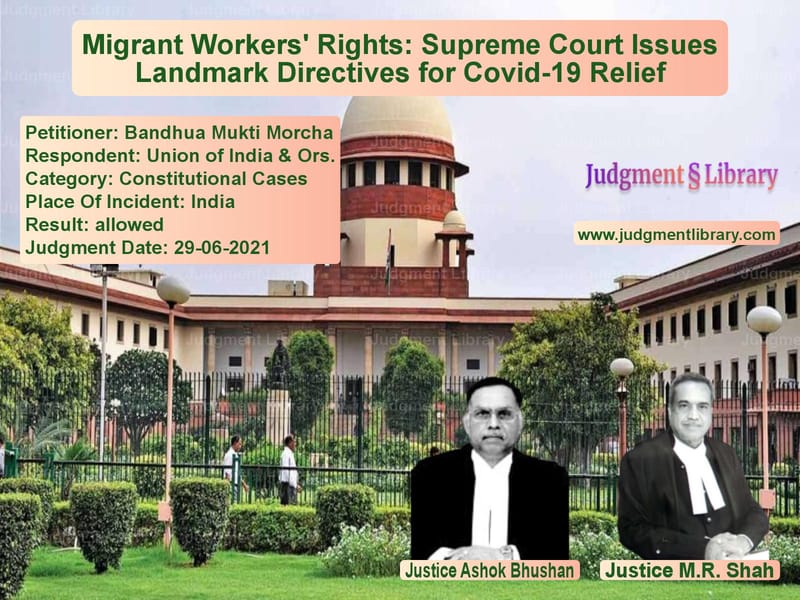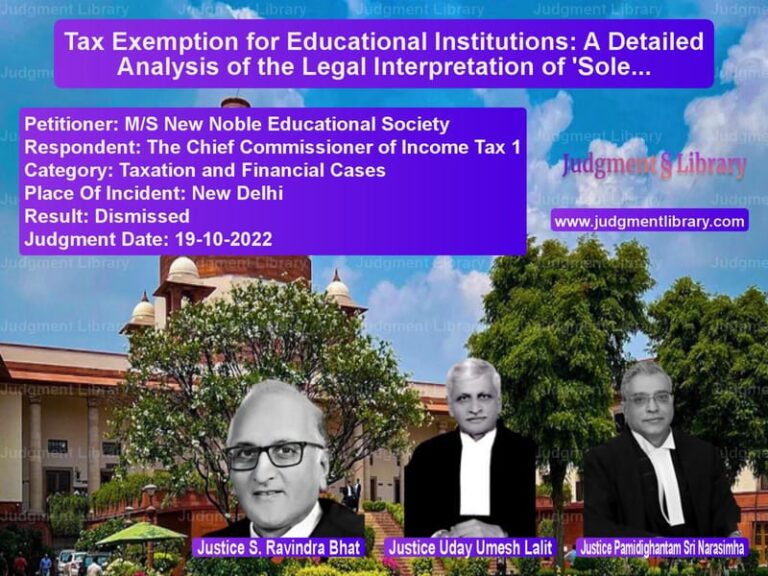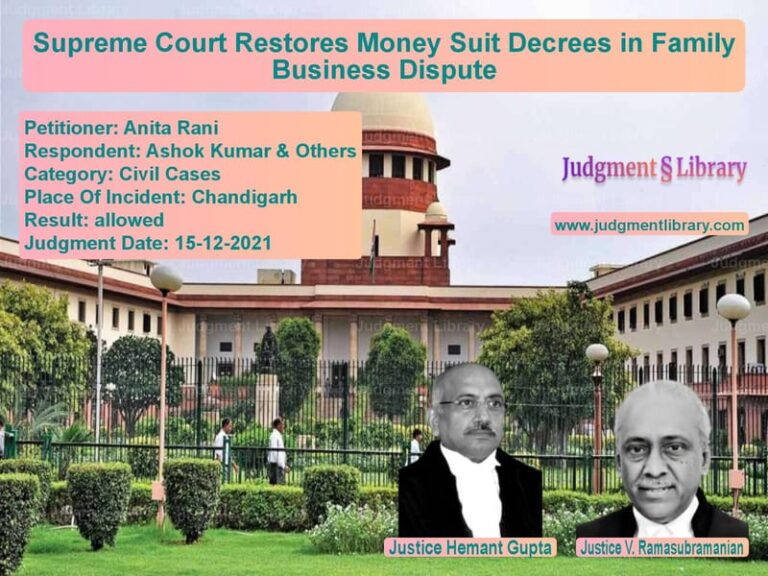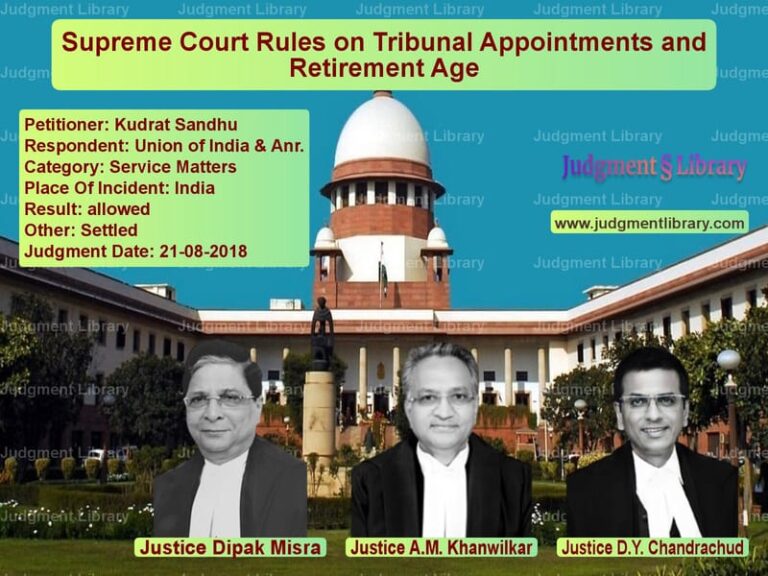Migrant Workers’ Rights: Supreme Court Issues Landmark Directives for Covid-19 Relief
The Covid-19 pandemic caused an unprecedented crisis, particularly affecting migrant workers across India. The Supreme Court, in In Re: Problems and Miseries of Migrant Labourers, took suo motu cognizance of the hardships faced by millions of workers who were stranded due to nationwide lockdowns and lack of employment. This case, alongside Bandhua Mukti Morcha v. Union of India, led to significant directions aimed at protecting the rights and welfare of migrant workers.
Background of the Case
The Covid-19 pandemic led to severe disruptions in employment, forcing thousands of migrant workers to return to their native places on foot, bicycles, or overcrowded transport options. The Supreme Court intervened in May 2020 and registered a suo motu writ petition to examine the state’s response to this crisis.
Despite various government measures, the lack of a proper implementation framework left many workers without food, shelter, or financial aid. The petitions sought the following key reliefs:
- Provision of food and shelter to stranded migrant workers.
- Issuance of travel facilities for those who wished to return home.
- Implementation of welfare schemes, including financial assistance.
- Provision of ex gratia relief under the Disaster Management Act, 2005.
- Strict implementation of labor laws ensuring job security and fair wages.
Arguments Presented
Petitioners’ Arguments
The petitioners, led by public interest groups such as Bandhua Mukti Morcha, contended that:
- The government failed to implement a proper mechanism for ensuring food security and financial assistance to migrant workers.
- Despite various labor laws such as the Inter-State Migrant Workmen Act, 1979, employers and contractors had failed to maintain records of migrant workers, leading to their exclusion from welfare benefits.
- The lack of implementation of One Nation One Ration Card (ONORC) deprived thousands of access to subsidized food.
- The absence of a proper registration system for unorganized workers resulted in their exclusion from state and central government schemes.
- Compensation should be provided to all affected migrant workers under the National Disaster Response Fund (NDRF).
Respondents’ Arguments
The Union of India, represented by Solicitor General Tushar Mehta, defended the government’s efforts, arguing that:
- The government had launched several schemes, such as PM Garib Kalyan Yojana and Atma Nirbhar Bharat Package, which covered food security and financial assistance.
- Over 171 Shramik trains were deployed to transport migrant workers to their native states.
- State governments were responsible for implementing ration distribution and other benefits.
- Financial constraints and logistical issues prevented the government from issuing universal compensation to all migrant workers.
- The government was in the process of implementing a national database for unorganized workers.
Supreme Court’s Observations and Judgment
The Supreme Court, led by Justices Ashok Bhushan and M.R. Shah, analyzed the submissions and made several crucial observations:
- The government had a statutory obligation under the Disaster Management Act, 2005 to ensure relief measures for affected workers.
- Despite government schemes, implementation was weak due to lack of proper registration and awareness.
- The failure to issue proper death certificates for Covid-19 victims created hardships for families seeking relief.
- Financial constraints could not be an excuse to deny compensation and basic relief.
- The right to food and shelter is integral to Article 21 of the Indian Constitution.
Key Directives Issued by the Supreme Court
The Court issued a series of landmark directives aimed at ensuring comprehensive relief to migrant workers:
1. Implementation of One Nation One Ration Card (ONORC)
- All states and union territories must implement ONORC by July 31, 2021 to ensure food security for migrant workers.
- Ration distribution must be seamless across states, allowing workers to access subsidized food at any location.
2. Nationwide Registration of Unorganized Workers
- The Central Government was directed to complete the creation of a National Database for Unorganized Workers (NDUW) by July 31, 2021.
- States were instructed to ensure mandatory registration of all unorganized and migrant workers by December 31, 2021.
3. Distribution of Dry Rations
- All states must formulate schemes for free dry ration distribution to migrant workers, continuing until the end of the Covid-19 crisis.
- The Central Government was ordered to allocate additional food grains to states for this purpose.
4. Implementation of Welfare Schemes
- The government was instructed to streamline the implementation of existing welfare schemes to ensure migrant workers received their benefits.
- State governments were directed to set up counseling centers to help workers avail benefits under government schemes.
5. Community Kitchens for Migrant Workers
- All states were directed to continue running community kitchens in urban and rural areas, ensuring no migrant worker remained hungry.
- The Court emphasized that states must widely publicize the locations of these kitchens.
Impact of the Judgment
The Supreme Court’s judgment marks a crucial intervention in safeguarding the rights of India’s vast migrant workforce. The directives:
- Ensure that food security reaches all affected workers, irrespective of their state of residence.
- Mandate the creation of a long-overdue national database for unorganized workers.
- Prevent bureaucratic hurdles in ration distribution through the ONORC system.
- Emphasize the constitutional right to food, shelter, and dignity for all workers.
Conclusion
The Supreme Court’s judgment in In Re: Problems and Miseries of Migrant Labourers serves as a milestone in recognizing the rights of vulnerable workers. By directing the government to implement long-term solutions, such as a national worker database and the One Nation One Ration Card system, the judgment aims to prevent future humanitarian crises.
The appeal was allowed, with the Court issuing binding directives to the government to ensure food security, proper registration, and financial aid for migrant workers.
Petitioner Name: Bandhua Mukti Morcha.Respondent Name: Union of India & Ors..Judgment By: Justice Ashok Bhushan, Justice M.R. Shah.Place Of Incident: India.Judgment Date: 29-06-2021.
Don’t miss out on the full details! Download the complete judgment in PDF format below and gain valuable insights instantly!
Download Judgment: bandhua-mukti-morcha-vs-union-of-india-&-ors-supreme-court-of-india-judgment-dated-29-06-2021.pdf
Directly Download Judgment: Directly download this Judgment
See all petitions in Public Interest Litigation
See all petitions in Fundamental Rights
See all petitions in Judgment by Ashok Bhushan
See all petitions in Judgment by Mukeshkumar Rasikbhai Shah
See all petitions in allowed
See all petitions in supreme court of India judgments June 2021
See all petitions in 2021 judgments
See all posts in Constitutional Cases Category
See all allowed petitions in Constitutional Cases Category
See all Dismissed petitions in Constitutional Cases Category
See all partially allowed petitions in Constitutional Cases Category







